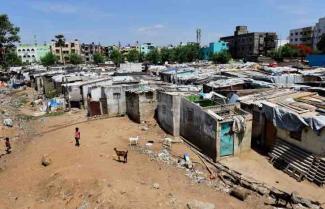The Odisha unit of the All India Lawyers Association For Justice – AILAJ conducted a survey of six slums across the city of Berhampur, the third largest city of Odisha. Based on the findings of this survey, which have been published as a report, AILAJ has prepared a 15-point set of demands. We reproduce the demands below in the confidence that it will be of help to activists and residents of other towns and cities in organising slum dwellers’ resistance for dignified housing as an entitlement.
1. The government should file a review petition in the NGT case O.A. of 82 of 2015. It should admit its selectiveness in pointing out the names of 42 slums, over several pucca structures and government buildings which continue to stand on ponds and on the embankments of water bodies. It should instead submit a proposal for rejuvenation of water bodies of the city, without destroying sustainable communities which are settled on embankments of the ponds. Before this, it should not seek to enforce the latest order of the NGT on March 3, 2022 of destroying the ten named slums.
2. The state government should legislate on the question of slum dwellers rights making in-situ housing mandatory and legislate to make this applicable irrespective of any judgement. The existing Odisha Land Rights to Slum Dwellers Act of 2017 excludes Municipal Corporations and has many exceptions. The Odisha State legislature should legislate for these rights to be provided without any exceptions in all areas.
3. The government should recognise that slums come up as a result of the failure of the government to provide housing, which is an integral part of the right to life, which includes the right to live with dignity under Article 21. This is a positive right and enjoins the Municipal Corporation to carry out their duty of providing housing to all, as per the Odisha High Court decision in Rutuparna Mohanty v. State of Orissa (2010)
4. All slum dwellers, irrespective of court orders, should be provided with in-situ housing and land rights in their existing housing. A review of all slums, which have been declared untenable and given notice of demolition is the need of the hour.
5. All eviction and demolition exercises should be stopped. The government should abide by the Delhi High Court judgment in Sudama Singh v. Government of Delhi (2010) and only clear land when it falls within the public purpose. A survey must be conducted to determine eligibility of relocation prior to demolition with ‘meaningful engagement’ of the residents, and relocation options must be identified to all eligible beneficiaries prior to demolition. The court should follow the direction of the Delhi High Court in Ajay Maken v. Government of Delhi (2019) against forced and unannounced eviction, without following proper guidelines. No eviction should be carried out without effective rehabilitation, with all civic facilities.
6. The government should ramp up the pace of the JAGA mission and take steps to extend it to Municipal Corporations, as soon as possible, by giving land rights in the existing land to slum dwellers. Three months have passed since the announcement of this move by the government, but no steps have been taken towards providing land rights to slum-dwellers. Slums on the brink of eviction and destruction by the administration should be reconsidered for accommodation under the JAGA scheme. Beneficiary-led-construction and upgradation of houses should be carried out after providing land rights to the slum-dwellers.
7. Electricity, water and drainage facilities should be made available to all bastis, including those which have been partly demolished.
8. The government should carry out an environmental review of housing projects it plans to construct on the embankments of water bodies like the Haradakhandi Housing project. It should recognise that selective targeting of slums for demolition, over pucca government or private structures is arbitrary and therefore violates the right to equality under Article 14 of the constitution.
9. The Coronavirus pandemic has deeply affected the livelihood of slum dwellers. The government must provide a compensation of 1 lakh to each family, in addition to the amount disbursed for death of a family member.
10.School, Anganwadi and Primary Health Centre should be set up close to every existing basti and housing complex.
11. Liquor shops, bars and liquor factories near these slums should be closed. Arrangements should be made for street-lighting to ensure the safety of all slum residents.
12. Steps should be taken to preserve livelihood and civic facility linkages during the relocation of slum dwellers. A relocation bhatta or allowance of one thousand rupees-per-month should be given to each beneficiary family, which was relocated away from its erstwhile slum. A medical allowance should be given to the elderly who have been given housing in the upper floors of these housing complexes. The capacity of schools and primary health care centres should be improved to accommodate the influx in population due to relocation.
13. Parks and recreation centres should be created in each housing society as per the mandate of the guidelines
14. Slums and housing projects should no longer be treated as a pariah in the municipal system and all schemes should be extended to them. There should be regular cleaning, sanitation facilities and spraying of disinfectants in these projects, just as it is done in the rest of the city. These places are dengue hotspots and immediate steps should be taken to stop this.
15. A Slum Dwellers Association should be created in each slum and housing project. Funds from the Municipal Corporation should be devolved to these associations so that they can carry out routine day-to-day maintenance in their premises, as per the RAY guidelines.











